牛津译林版英语八年级下Unit 1 Past and Present Revision 课件(36张PPT无素材)
文档属性
| 名称 | 牛津译林版英语八年级下Unit 1 Past and Present Revision 课件(36张PPT无素材) |

|
|
| 格式 | zip | ||
| 文件大小 | 9.7MB | ||
| 资源类型 | 教案 | ||
| 版本资源 | 牛津译林版 | ||
| 科目 | 英语 | ||
| 更新时间 | 2020-05-15 00:00:00 | ||
图片预览

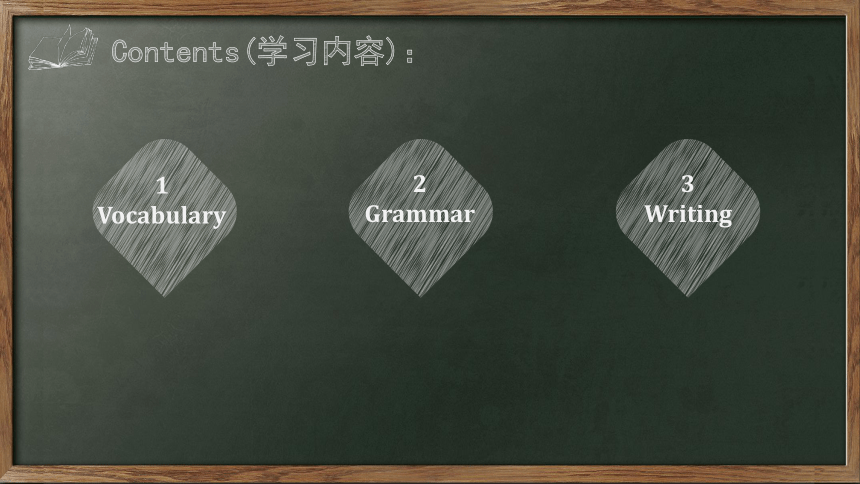
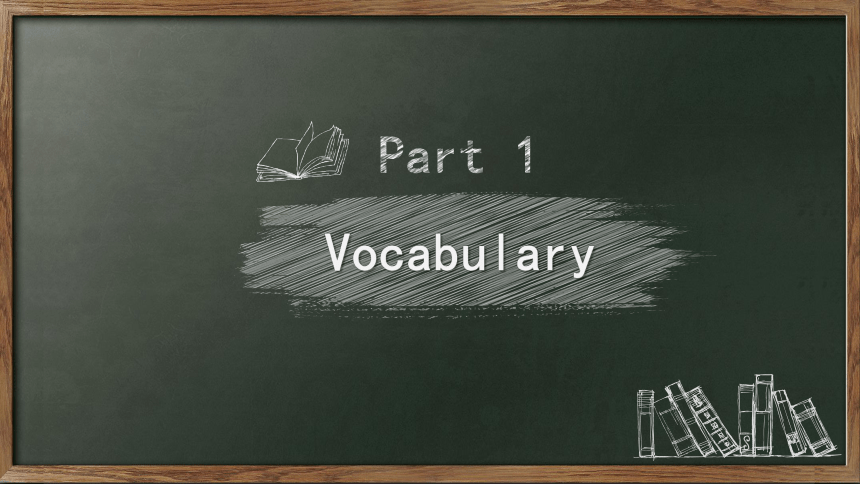


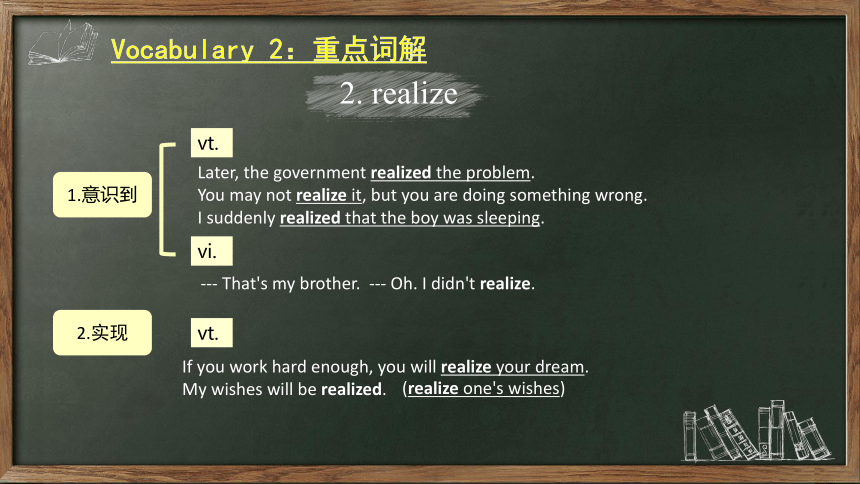
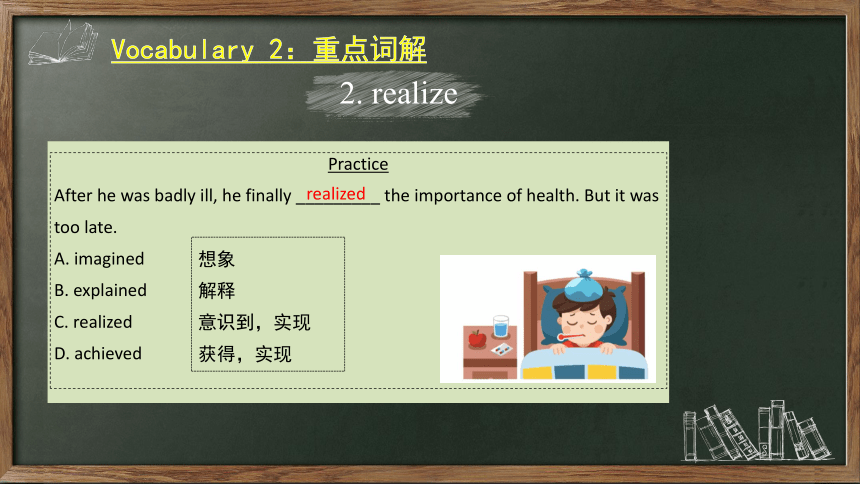
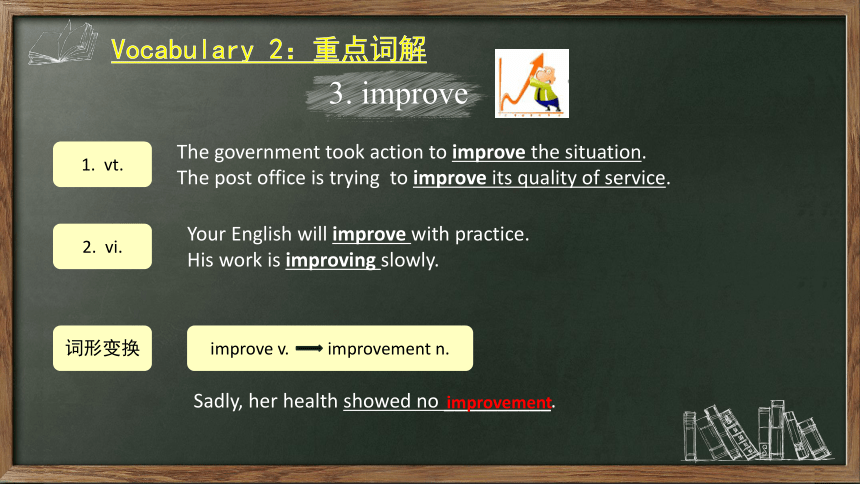

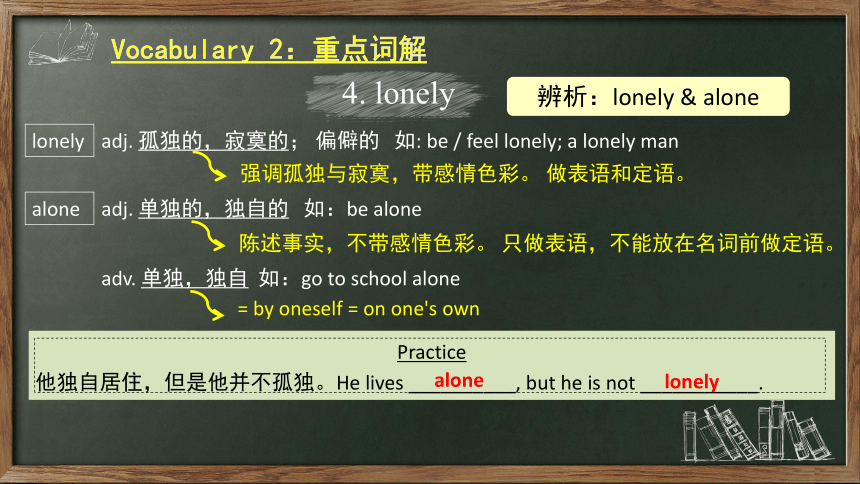
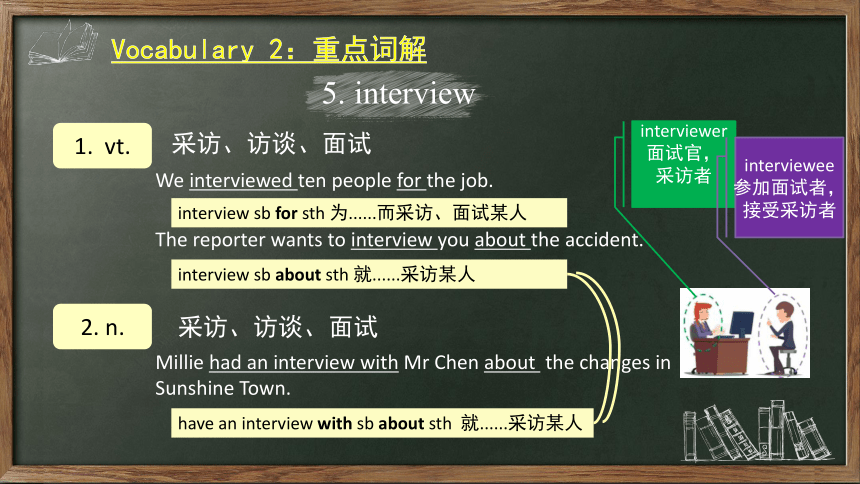
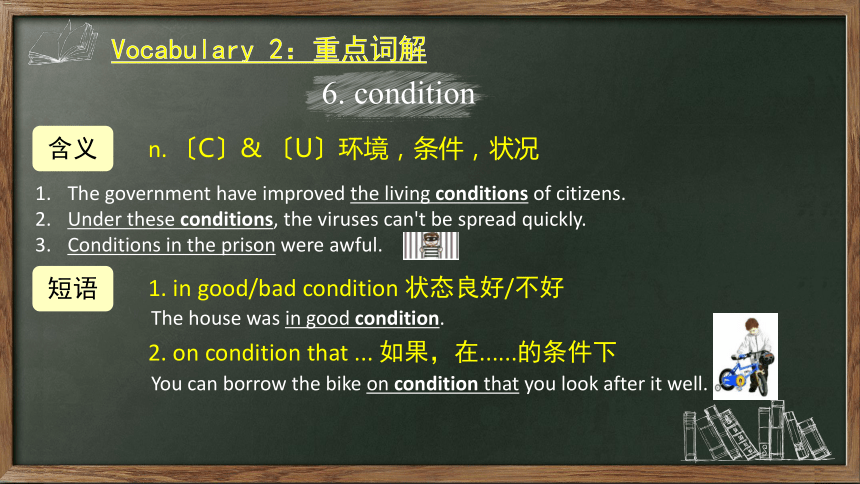
文档简介
(共36张PPT)
8B Unit 1 Past and Present
Revision
Contents(学习内容):
1
Vocabulary
2
Grammar
3
Writing
Vocabulary
Part 1
Vocabulary 1:词形变换
→ __________ (pl.)
→ __________ (pl.)
→ __________ (adj.)
→ __________ (adj.) → __________ (n.)
→ __________ (n. )
→ __________ (n. ) → __________ (opposite)
→ __________ (n. )
→ __________ (adj. )
→ __________ (n. )
→ __________ (adv. )
1. wife n.
2. factory n.
3. north n.
4. marry v.
5.pollute v.
6. possible adj.
7.interview v.
8. recently adv.
9.communicate v.
10. exact adj.
wives
factories
northern
(un)married
marriage
pollution
possibility
impossible
interviewer
recent
communication
exactly
Vocabulary 2:重点词解
1. waste
〔U〕废料;废品
You should keep the waste in a special place.
a waste of ... 白费......、浪费......
It's a waste of time talking to him.
3. adj.
2. vt.
1. n.
浪费
Please don't waste water.
废弃的;丢弃的;无用的
waste paper 废纸; waste water 废水
Practice
他认为,度假浪费时间和金钱。
In his opinion, taking a holiday is_________________________.
a waste of time and money
Vocabulary 2:重点词解
2. realize
1.意识到
vt.
Later, the government realized the problem.
You may not realize it, but you are doing something wrong.
I suddenly realized that the boy was sleeping.
vi.
--- That's my brother. --- Oh. I didn't realize.
2.实现
If you work hard enough, you will realize your dream.
My wishes will be realized.
(realize one's wishes)
vt.
Vocabulary 2:重点词解
2. realize
Practice
After he was badly ill, he finally _________ the importance of health. But it was too late.
A. imagined
B. explained
C. realized
D. achieved
想象
解释
意识到,实现
获得,实现
realized
Vocabulary 2:重点词解
3. improve
1. vt.
2. vi.
The government took action to improve the situation.
The post office is trying to improve its quality of service.
Your English will improve with practice.
His work is improving slowly.
词形变换
improve v. improvement n.
Sadly, her health showed no __________.
improvement
Vocabulary 2:重点词解
4. lonely
1. adj. 孤独的,寂寞的
Mr Chen feels lonely from time to time.
The young man lives a lonely life with few friends.
放在连系动词后做表语
放在名词前做定语
unhappy because you are not with other people
2. adj. 偏僻的
A lonely place is a long way from where people live
It felt like the loneliest place in the world.
Vocabulary 2:重点词解
4. lonely
辨析:lonely & alone
lonely
adj. 孤独的,寂寞的; 偏僻的 如: be / feel lonely; a lonely man
强调孤独与寂寞,带感彩。 做表语和定语。
alone
adj. 单独的,独自的 如:be alone
陈述事实,不带感彩。 只做表语,不能放在名词前做定语。
adv. 单独,独自 如:go to school alone
= by oneself = on one's own
Practice
他独自居住,但是他并不孤独。He lives __________, but he is not ___________.
alone
lonely
Vocabulary 2:重点词解
5. interview
1. vt.
2. n.
采访、访谈、面试
We interviewed ten people for the job.
The reporter wants to interview you about the accident.
interview sb for sth 为......而采访、面试某人
interview sb about sth 就......采访某人
采访、访谈、面试
Millie had an interview with Mr Chen about the changes in Sunshine Town.
have an interview with sb about sth 就......采访某人
interviewer 面试官,采访者
interviewee参加面试者,接受采访者
Vocabulary 2:重点词解
6. condition
n. 〔C〕& 〔U〕环境,条件,状况
The government have improved the living conditions of citizens.
Under these conditions, the viruses can't be spread quickly.
Conditions in the prison were awful.
含义
短语
1. in good/bad condition 状态良好/不好
The house was in good condition.
2. on condition that ... 如果,在......的条件下
You can borrow the bike on condition that you look after it well.
Practice
1. Sally became a member of the company after the job___________(面试).
2. The little girl will travel____________ (在国外)to learn more about art.
3. Hong Kong ____________ (回归)to China in 1997.
4. Lucy and Tom have been in love for many years and they’ll get
____________(结婚的)next month.
5. They are planning to build a few new____________ (工厂)in the country.
interview
abroad
returned
married
factories
Vocabulary 3:重点短语
过去常常做某事
习惯于(做)某事
非常了解某人/非常喜欢某人
搬家
与某人结婚(短暂性)〔2种表达〕
与某人结婚(延续性)
把某物变成某物
乘公交往返镇上
出国
上小学
(与某人)保持联系
通过邮件交流
used to do sth/ used to be ...
be used to (doing) sth
know sb very well/ like sb very much
move house
marry sb/ get married to sb
be married to sb
turn sth into sth
travel to and from the town by bus
go abroad(短暂性) / be abroad (延续性)
be at primary school
keep in touch (with sb)
communicate by mail
Vocabulary 3:核心短语详解
1. used to do sth / used to be ...
含义
表示 “过去常常”, 强调现在与过去的对比,暗示现在不做了。
I used to play with my friends after school.
I used not to play with my friends after school.
=I didn't use to play with my friends after school.
Did you use to play with your friends after school?
Where did you use to play with your friends?
否定式
疑问式
句型转换
常用句式
There used to be ... 过去常常有......
There used to be a lot of fish in the river.
Vocabulary 3:核心短语详解
2. be/get used to (doing) sth
be used to ... 习惯于,适应于......
get used to ... 习惯于,适应于......
强调状态
强调动作
He is used to drinking tea with honey.
It's not easy to get used to the changes of life quickly.
+
名词
代词
V-ing
辨析
be used to doing sth.
be used to do sth.
used to do sth.
习惯于做......
被用来做......
过去常常做......
She is used to getting up early.
Knives are used to cut things.
He used to go to bed early.
被动语态+目的
只用于过去时
Practice
1.他们通过邮件交流来保持联系。
They communicate by mail to keep in touch.
2. 市中心过去有一个工厂,现在政府已经把它变成了一个公园。
There used to be a factory in the city centre. Now the
government has already turned it into a park.
3. 很快适应生活的改变是不容易的。
It's not easy to get used to the changes in life.
Grammar
Part 2
现在完成时的构成、用法和时间状语
Grammar 1:现在完成时的构成
have / has+ 过去分词
The town has changed a lot over the years.
肯定句
Has the town changed a lot over the years?
一般疑问句句
否定句
The town hasn't changed a lot over the years.
回答
肯定: Yes, it has.
否定:No, it hasn't.
Grammar 1:现在完成时的构成
过去分词的构成规则
1. 规则动词
与过去式的构成方法相同
动词特征 变化 例词
一般情况 词尾加-ed worked
以e结尾 词尾加-d lived
以“辅音字母+y”结尾 变y为i, 再加-ed studied, cried, worried
以重读闭音节结尾,末尾只有一个辅音字母 双写该辅音字母,再加-ed stopped, dropped, stepped
2. 不规则动词
对照课本P122-123的不规则动词表专门记忆
Grammar 2:现在完成时的用法
用法1:We use present perfect tense to talk about an action that started in the past and continues to the present. (P12)
表示动作开始于过去,持续到现在
for +时间段;
since +过去的时间;
How long
for + 时间段
They have studied English for 9 years.
since + 过去的时间
Mr Chen has lived in the town since then.
Mr Chen has lived in the town since he was born.
How long
How long have they studied English?
How long has Mr Chen lived in the town?
表示“开始于过去,持续到现在”的肯定句中,主句动词为延续性动词
He has left for five minutes.
He has been away for five minutes.
×
√
Grammar 2:现在完成时的用法
用法2:We use present perfect tense to talk about an action that happened in the past and has a connection with the present. (P12)
表示动作发生于过去,跟现在有关联
I have just finished my homework.
I have already finished my homework.
I haven't finished my homework yet.
Have you finished your homework yet?
Have you ever seen a real monkey?
This is the best movie I have ever seen.
肯定句
肯定句
否、疑
肯、疑
Practice
Hobo has already eaten up Eddie's food. (改成一般疑问句)
Has Hobo eaten up Eddie's food yet?
Grammar 2:现在完成时的用法
用法3:We use present perfect tense to talk about how many times an action has happened till now. (P12)
表示动作到现在为止进行了多少次
never,twice,three times, How many times ...
I have read the book twice.
How many times have you watched the sunrise with your friends?
Grammar 3:时间状语
3.表示动作到现在为止进行了多少次
2.表示动作发生于过去,跟现在有关联
1. 表示动作开始于过去,持续到现在
4. 其他常用时间状语
for +时间段
since +过去的时间
How long
already
just
ever
yet
never
twice
three times
How many times
recently
before
so far
by now
up to now
over the years
in the past two years
Practice
用所给动词的适当时态填空。
1. The child __________ (eat) up all the food on the plate. Now there isn't anything on it.
2. My grandfather _________(live) in the countryside for fifty years, but now he lives
with us.
3. —Who will go to the airport to meet Mary?
—I will. I________ (meet)her several times. I can find her easily.
4. This is the first time I___________ (see) such a beautiful sea.
5. Frozen II is the best movie I _________ ever _________. (see)
has eaten
This is the first time sb has done sth.
... is the +最高级+n. sb has ever done.
lived
在乡下居住这个动作在过去持续了一段时间,并没有延续到现在,用一般过去时。
have met
have seen
have seen
Writing
Part 3
Changes in my home town
近年来,家乡变化很大
过去 现在
环境 安静的小镇:山清水秀,空气清新。 现代化的城镇:道路宽阔,高楼林立。
生活 居住在小房子里。人们听音乐、看电视、下象棋。 居住在现代化的公寓里。互联网和手机使得交流更便捷。
交通 人们骑自行车或步行出行。 人们乘坐公共交通或私家车出行。
你的感受 好处:喜欢现代化的新城镇和便捷的生活。
不足:自然环境没有之前好了。
假设你是李华,上个月你回到了家乡,发现变化很大。请根据以下表格提示写一篇题为“Changes in My Hometown”的短文。
Writing
Writing
beginning
Many changes have taken place in my home town over the years.
My home town has changed a lot over the years.
There have been great changes in my home town over the years.
“变化”三句型
Writing
main body
My home town used to be a quiet small town with green hills around it. The water was clean and the air was fresh. Now, it has turned into a modern town. The streets are wide and the government has built many tall buildings.
Writing
main body
Before, peple lived in small houses. They used to listen to music, watch TV or play chess for fun. Now, people live in modern flats. The Internet and mobile phones have made communication much easier.
Writing
main body
In the past, people travelled around the town on foot or by bike, but now, they can go around by bus, by underground or in their own cars.
Writing
ending
I think in some ways, life is better than before. It's really nice to live an easy life in a modern town. However, the environment is not as good as before. The rivers have become dirty and it has become impossible to hear birds sing as often as before. Anyway, it's good to see the amazing changes in my hometown.
In some ways .... ... However, .... ... Anyway, ....
变化带来的好处
变化带来的不足
总体正面的评价
Conclusion(总结):
key words
phrases
Present perfect tense:
structures
usages
time symbols
An article about
changes in my home town
1
Vocabulary
2
Grammar
3
Writing
Homework
Go over your notes and finish the after-class exercises on the website.
Vocabulary 2:重点词解
7. return
1. v. 回来、返回;归还
return vi. 回来,返回 = come/ go back
My friend Becky has just returned from the USA.
return vt. 归还 = give back
Please return the pen to him.
2. n. 回来、返回;归还
We are looking forward to their return.
The judge ordered the return of the child to his mum.
in return (for sth) 作为(......) 的回报
I gave her my seat and she gave me a smile in return.
She gave me a smile in return for my kindness.
8B Unit 1 Past and Present
Revision
Contents(学习内容):
1
Vocabulary
2
Grammar
3
Writing
Vocabulary
Part 1
Vocabulary 1:词形变换
→ __________ (pl.)
→ __________ (pl.)
→ __________ (adj.)
→ __________ (adj.) → __________ (n.)
→ __________ (n. )
→ __________ (n. ) → __________ (opposite)
→ __________ (n. )
→ __________ (adj. )
→ __________ (n. )
→ __________ (adv. )
1. wife n.
2. factory n.
3. north n.
4. marry v.
5.pollute v.
6. possible adj.
7.interview v.
8. recently adv.
9.communicate v.
10. exact adj.
wives
factories
northern
(un)married
marriage
pollution
possibility
impossible
interviewer
recent
communication
exactly
Vocabulary 2:重点词解
1. waste
〔U〕废料;废品
You should keep the waste in a special place.
a waste of ... 白费......、浪费......
It's a waste of time talking to him.
3. adj.
2. vt.
1. n.
浪费
Please don't waste water.
废弃的;丢弃的;无用的
waste paper 废纸; waste water 废水
Practice
他认为,度假浪费时间和金钱。
In his opinion, taking a holiday is_________________________.
a waste of time and money
Vocabulary 2:重点词解
2. realize
1.意识到
vt.
Later, the government realized the problem.
You may not realize it, but you are doing something wrong.
I suddenly realized that the boy was sleeping.
vi.
--- That's my brother. --- Oh. I didn't realize.
2.实现
If you work hard enough, you will realize your dream.
My wishes will be realized.
(realize one's wishes)
vt.
Vocabulary 2:重点词解
2. realize
Practice
After he was badly ill, he finally _________ the importance of health. But it was too late.
A. imagined
B. explained
C. realized
D. achieved
想象
解释
意识到,实现
获得,实现
realized
Vocabulary 2:重点词解
3. improve
1. vt.
2. vi.
The government took action to improve the situation.
The post office is trying to improve its quality of service.
Your English will improve with practice.
His work is improving slowly.
词形变换
improve v. improvement n.
Sadly, her health showed no __________.
improvement
Vocabulary 2:重点词解
4. lonely
1. adj. 孤独的,寂寞的
Mr Chen feels lonely from time to time.
The young man lives a lonely life with few friends.
放在连系动词后做表语
放在名词前做定语
unhappy because you are not with other people
2. adj. 偏僻的
A lonely place is a long way from where people live
It felt like the loneliest place in the world.
Vocabulary 2:重点词解
4. lonely
辨析:lonely & alone
lonely
adj. 孤独的,寂寞的; 偏僻的 如: be / feel lonely; a lonely man
强调孤独与寂寞,带感彩。 做表语和定语。
alone
adj. 单独的,独自的 如:be alone
陈述事实,不带感彩。 只做表语,不能放在名词前做定语。
adv. 单独,独自 如:go to school alone
= by oneself = on one's own
Practice
他独自居住,但是他并不孤独。He lives __________, but he is not ___________.
alone
lonely
Vocabulary 2:重点词解
5. interview
1. vt.
2. n.
采访、访谈、面试
We interviewed ten people for the job.
The reporter wants to interview you about the accident.
interview sb for sth 为......而采访、面试某人
interview sb about sth 就......采访某人
采访、访谈、面试
Millie had an interview with Mr Chen about the changes in Sunshine Town.
have an interview with sb about sth 就......采访某人
interviewer 面试官,采访者
interviewee参加面试者,接受采访者
Vocabulary 2:重点词解
6. condition
n. 〔C〕& 〔U〕环境,条件,状况
The government have improved the living conditions of citizens.
Under these conditions, the viruses can't be spread quickly.
Conditions in the prison were awful.
含义
短语
1. in good/bad condition 状态良好/不好
The house was in good condition.
2. on condition that ... 如果,在......的条件下
You can borrow the bike on condition that you look after it well.
Practice
1. Sally became a member of the company after the job___________(面试).
2. The little girl will travel____________ (在国外)to learn more about art.
3. Hong Kong ____________ (回归)to China in 1997.
4. Lucy and Tom have been in love for many years and they’ll get
____________(结婚的)next month.
5. They are planning to build a few new____________ (工厂)in the country.
interview
abroad
returned
married
factories
Vocabulary 3:重点短语
过去常常做某事
习惯于(做)某事
非常了解某人/非常喜欢某人
搬家
与某人结婚(短暂性)〔2种表达〕
与某人结婚(延续性)
把某物变成某物
乘公交往返镇上
出国
上小学
(与某人)保持联系
通过邮件交流
used to do sth/ used to be ...
be used to (doing) sth
know sb very well/ like sb very much
move house
marry sb/ get married to sb
be married to sb
turn sth into sth
travel to and from the town by bus
go abroad(短暂性) / be abroad (延续性)
be at primary school
keep in touch (with sb)
communicate by mail
Vocabulary 3:核心短语详解
1. used to do sth / used to be ...
含义
表示 “过去常常”, 强调现在与过去的对比,暗示现在不做了。
I used to play with my friends after school.
I used not to play with my friends after school.
=I didn't use to play with my friends after school.
Did you use to play with your friends after school?
Where did you use to play with your friends?
否定式
疑问式
句型转换
常用句式
There used to be ... 过去常常有......
There used to be a lot of fish in the river.
Vocabulary 3:核心短语详解
2. be/get used to (doing) sth
be used to ... 习惯于,适应于......
get used to ... 习惯于,适应于......
强调状态
强调动作
He is used to drinking tea with honey.
It's not easy to get used to the changes of life quickly.
+
名词
代词
V-ing
辨析
be used to doing sth.
be used to do sth.
used to do sth.
习惯于做......
被用来做......
过去常常做......
She is used to getting up early.
Knives are used to cut things.
He used to go to bed early.
被动语态+目的
只用于过去时
Practice
1.他们通过邮件交流来保持联系。
They communicate by mail to keep in touch.
2. 市中心过去有一个工厂,现在政府已经把它变成了一个公园。
There used to be a factory in the city centre. Now the
government has already turned it into a park.
3. 很快适应生活的改变是不容易的。
It's not easy to get used to the changes in life.
Grammar
Part 2
现在完成时的构成、用法和时间状语
Grammar 1:现在完成时的构成
have / has+ 过去分词
The town has changed a lot over the years.
肯定句
Has the town changed a lot over the years?
一般疑问句句
否定句
The town hasn't changed a lot over the years.
回答
肯定: Yes, it has.
否定:No, it hasn't.
Grammar 1:现在完成时的构成
过去分词的构成规则
1. 规则动词
与过去式的构成方法相同
动词特征 变化 例词
一般情况 词尾加-ed worked
以e结尾 词尾加-d lived
以“辅音字母+y”结尾 变y为i, 再加-ed studied, cried, worried
以重读闭音节结尾,末尾只有一个辅音字母 双写该辅音字母,再加-ed stopped, dropped, stepped
2. 不规则动词
对照课本P122-123的不规则动词表专门记忆
Grammar 2:现在完成时的用法
用法1:We use present perfect tense to talk about an action that started in the past and continues to the present. (P12)
表示动作开始于过去,持续到现在
for +时间段;
since +过去的时间;
How long
for + 时间段
They have studied English for 9 years.
since + 过去的时间
Mr Chen has lived in the town since then.
Mr Chen has lived in the town since he was born.
How long
How long have they studied English?
How long has Mr Chen lived in the town?
表示“开始于过去,持续到现在”的肯定句中,主句动词为延续性动词
He has left for five minutes.
He has been away for five minutes.
×
√
Grammar 2:现在完成时的用法
用法2:We use present perfect tense to talk about an action that happened in the past and has a connection with the present. (P12)
表示动作发生于过去,跟现在有关联
I have just finished my homework.
I have already finished my homework.
I haven't finished my homework yet.
Have you finished your homework yet?
Have you ever seen a real monkey?
This is the best movie I have ever seen.
肯定句
肯定句
否、疑
肯、疑
Practice
Hobo has already eaten up Eddie's food. (改成一般疑问句)
Has Hobo eaten up Eddie's food yet?
Grammar 2:现在完成时的用法
用法3:We use present perfect tense to talk about how many times an action has happened till now. (P12)
表示动作到现在为止进行了多少次
never,twice,three times, How many times ...
I have read the book twice.
How many times have you watched the sunrise with your friends?
Grammar 3:时间状语
3.表示动作到现在为止进行了多少次
2.表示动作发生于过去,跟现在有关联
1. 表示动作开始于过去,持续到现在
4. 其他常用时间状语
for +时间段
since +过去的时间
How long
already
just
ever
yet
never
twice
three times
How many times
recently
before
so far
by now
up to now
over the years
in the past two years
Practice
用所给动词的适当时态填空。
1. The child __________ (eat) up all the food on the plate. Now there isn't anything on it.
2. My grandfather _________(live) in the countryside for fifty years, but now he lives
with us.
3. —Who will go to the airport to meet Mary?
—I will. I________ (meet)her several times. I can find her easily.
4. This is the first time I___________ (see) such a beautiful sea.
5. Frozen II is the best movie I _________ ever _________. (see)
has eaten
This is the first time sb has done sth.
... is the +最高级+n. sb has ever done.
lived
在乡下居住这个动作在过去持续了一段时间,并没有延续到现在,用一般过去时。
have met
have seen
have seen
Writing
Part 3
Changes in my home town
近年来,家乡变化很大
过去 现在
环境 安静的小镇:山清水秀,空气清新。 现代化的城镇:道路宽阔,高楼林立。
生活 居住在小房子里。人们听音乐、看电视、下象棋。 居住在现代化的公寓里。互联网和手机使得交流更便捷。
交通 人们骑自行车或步行出行。 人们乘坐公共交通或私家车出行。
你的感受 好处:喜欢现代化的新城镇和便捷的生活。
不足:自然环境没有之前好了。
假设你是李华,上个月你回到了家乡,发现变化很大。请根据以下表格提示写一篇题为“Changes in My Hometown”的短文。
Writing
Writing
beginning
Many changes have taken place in my home town over the years.
My home town has changed a lot over the years.
There have been great changes in my home town over the years.
“变化”三句型
Writing
main body
My home town used to be a quiet small town with green hills around it. The water was clean and the air was fresh. Now, it has turned into a modern town. The streets are wide and the government has built many tall buildings.
Writing
main body
Before, peple lived in small houses. They used to listen to music, watch TV or play chess for fun. Now, people live in modern flats. The Internet and mobile phones have made communication much easier.
Writing
main body
In the past, people travelled around the town on foot or by bike, but now, they can go around by bus, by underground or in their own cars.
Writing
ending
I think in some ways, life is better than before. It's really nice to live an easy life in a modern town. However, the environment is not as good as before. The rivers have become dirty and it has become impossible to hear birds sing as often as before. Anyway, it's good to see the amazing changes in my hometown.
In some ways .... ... However, .... ... Anyway, ....
变化带来的好处
变化带来的不足
总体正面的评价
Conclusion(总结):
key words
phrases
Present perfect tense:
structures
usages
time symbols
An article about
changes in my home town
1
Vocabulary
2
Grammar
3
Writing
Homework
Go over your notes and finish the after-class exercises on the website.
Vocabulary 2:重点词解
7. return
1. v. 回来、返回;归还
return vi. 回来,返回 = come/ go back
My friend Becky has just returned from the USA.
return vt. 归还 = give back
Please return the pen to him.
2. n. 回来、返回;归还
We are looking forward to their return.
The judge ordered the return of the child to his mum.
in return (for sth) 作为(......) 的回报
I gave her my seat and she gave me a smile in return.
She gave me a smile in return for my kindness.
